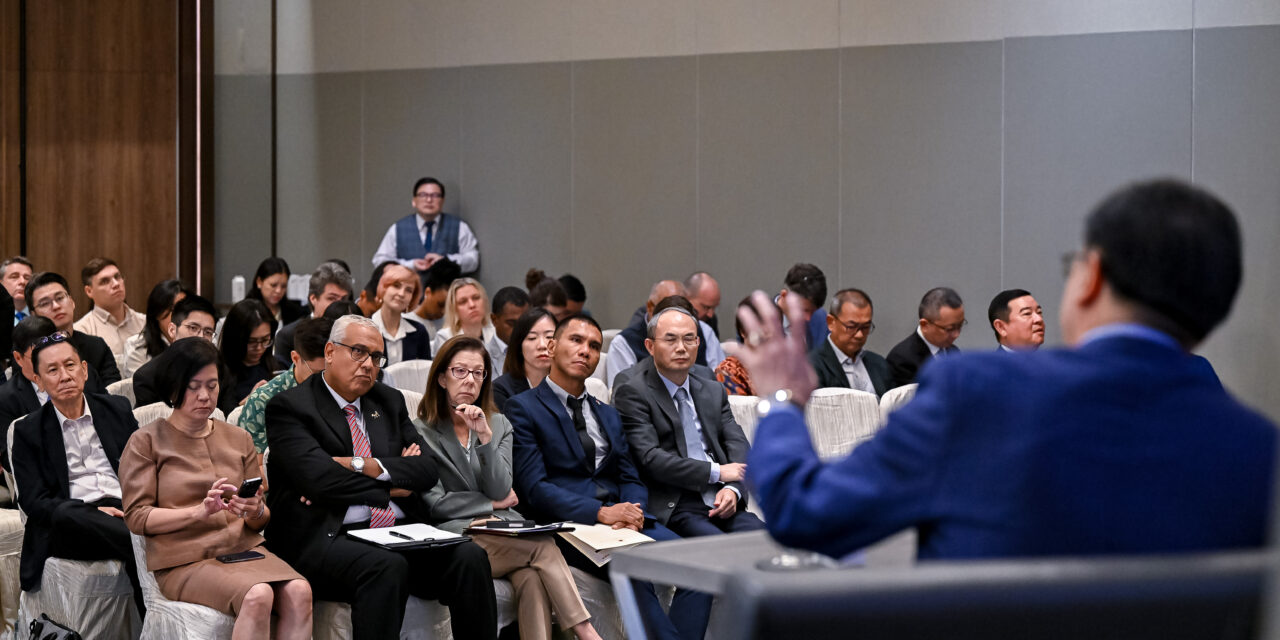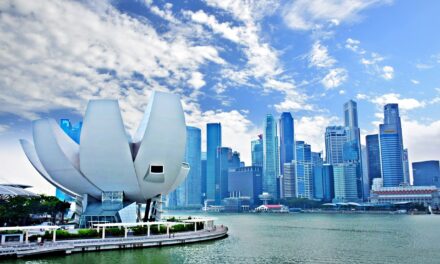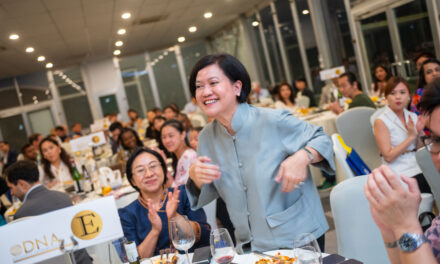Diplomatic Network (Asia) hosted on Wednesday a high-level roundtable between ambassadors from ASEAN and BRICS nations to discuss the topic of global governance and sustainable trade in the interest of food security.
The event took place at hotel Pan Pacific Singapore on Raffles Boulevard.
In the introduction to the roundtable, Melvin Lim, the general manager of Pan Pacific Singapore, emphasized food security as “one of the most pressing issues we face today”.
In his opening remarks, His Excellency Sengkeo Pouangpadith, the ASEAN dean and ambassador of Laos to Singapore, concurred that the issue is important for the large, combined populations of ASEAN and BRICS.
ASEAN, or the Association of Southeast Asian Nations, is a regional organization comprised of 10 Southeast Asian countries – namely Brunei Darussalam, Cambodia, Indonesia, Laos, Malaysia, Myanmar, Philippines, Singapore, Thailand, and Vietnam.
BRICS is an association of major emerging economies – including Brazil, Russia, India, China, and South Africa. Iran, Egypt, Ethiopia, and the United Arab Emirates joined BRICS at the beginning of 2024.
HE Nikolay Kudachev, BRICS chair and ambassador of Russia to Singapore, explained that BRICS is more than an economic bloc with members working in mutual dialogue alongside guiding principles to build a better economic world.
The event was highlighted by productive and diverse discussions, with the ambassadors sharing their optimism about the fruitfulness of the partnership between ASEAN and BRICS.
Strategies for food security
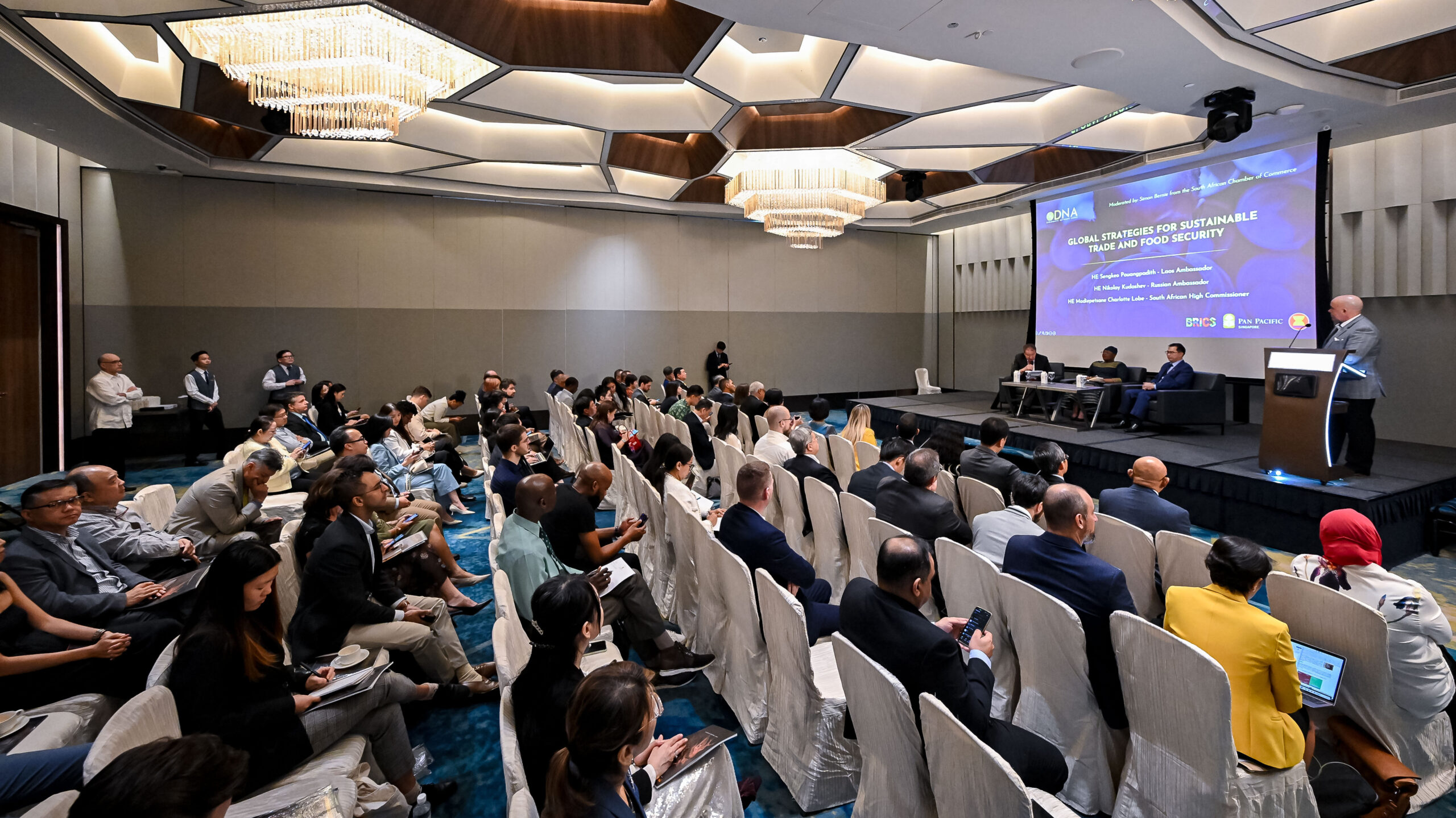
The first roundtable saw HE Nikolay Kudachev, HE Sengkeo Pouangpadith and HE Madiepetsane Charlotte Lobe, the South African high commissioner in Singapore, discuss global strategies towards trade and food security.
Kudachev noted the Russian definition of “food security” as a stage of socio-economic development where accessibility to food products meets expected standards and sufficiency for all citizens.
Lobe underlined the issue is far from an “academic debate”, but rather, a significant human rights issue. “Food security is the one area where none of us is more beautiful than the other,” Lobe said.
As highlighted by the panelists, BRICS and ASEAN are heavily involved in and reliant on food exports.
Singapore sources 90% of its food from other countries, while BRICS occupy a third of agricultural land and produce 40% of dairy products on Earth. However, the need for food security is increasingly urgent, as estimates suggest that within the next 10 years food consumption will exceed production.
Furthermore, inequalities in supply chains were exposed during the COVID-19 pandemic when underdeveloped countries faced severe problems in food security.
Pouangpadith candidly noted that landlocked nations like Laos would naturally have to address their own self-sufficiency first before exporting food supplies.
When asked how global governance can tackle food scarcity and inequality, all three ambassadors agreed that good cooperation within multilateral organizations like BRICS and ASEAN would create a strong foundation for progress.
In March this year, a BRICS grain exchange was proposed by the chair of Russia’s Union of Grain Exporters.
The proposed BRICS grain exchange seeks to secure supply lines for developing economies. Furthermore, logistics and agricultural training at a local level would reinforce the supply chains of developing nations.
Aligning trade practices between ASEAN and BRICS
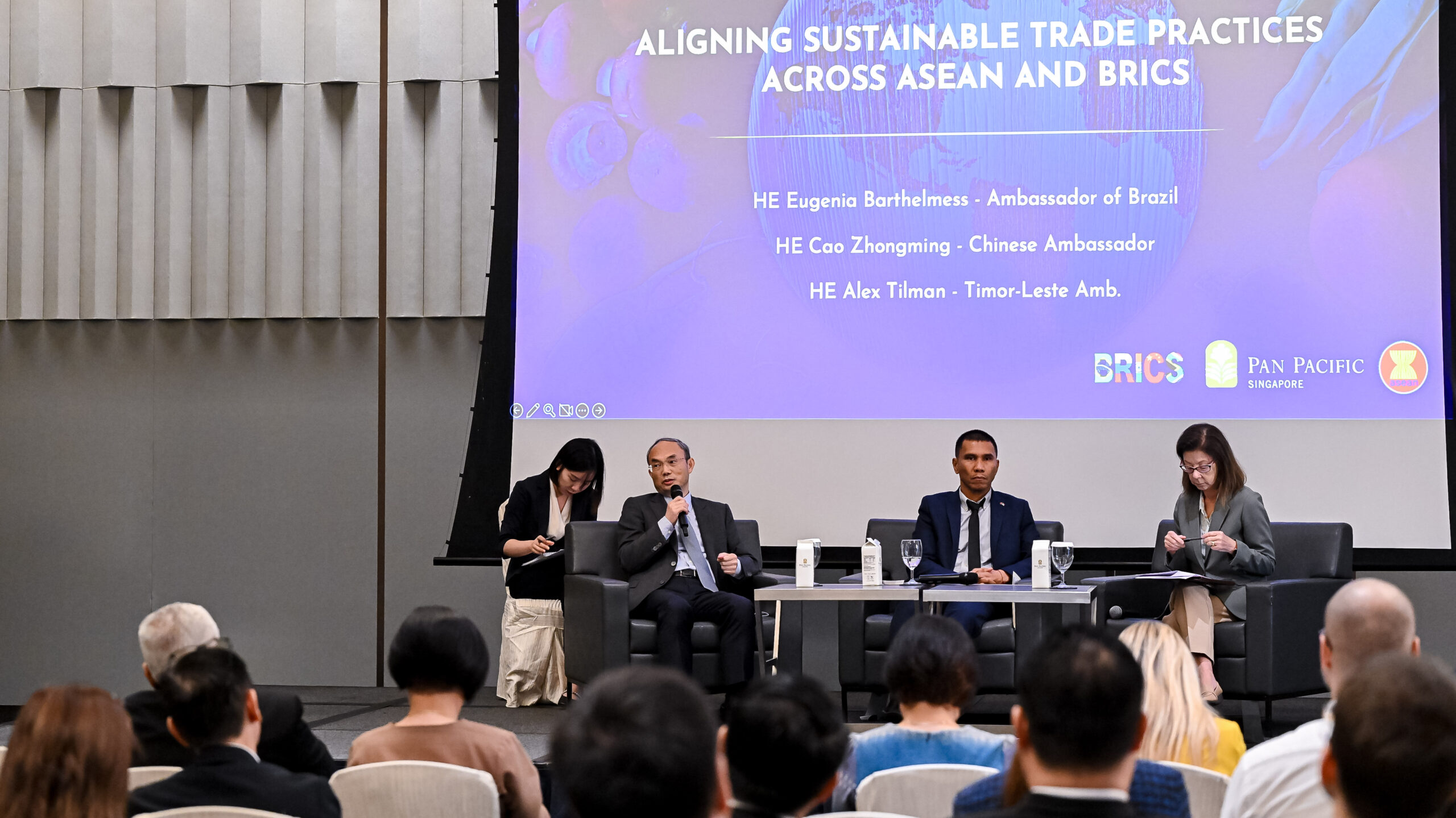
The second roundtable included other ambassadors to Singapore, including HE Eugenia Barthelmess, the ambassador of Brazil; HE Cao Zhongming, the ambassador of China; and HE Alex Tilman, the ambassador of Timor-Leste.
The three were asked questions pertaining to current trade practices between ASEAN and BRICS. Driving the discussion, they provided specific initiatives to enhance food security.
For Cao, China plays an important role in the global supply chain as 9% of the world’s arable land and 6% of its freshwater supplies are found in the world’s second-largest economy. Cao stated China is committed to strengthening its internal production to continue high yields for export.
Since 2006, China has invested heavily in agricultural developments and technology, leading to the rise of “new farmers”, a group of professionals that use modern innovations such as big data and fertilizer drones to manage farms.
Furthermore, Cao noted that China has sent USD130 million towards international development. This has especially benefitted ASEAN economies, he said.
International economic cooperation such as this, combined with China’s internal growth, will boost the development of the global market.
Barthelmess noted that Brazil is the world’s largest producer and exporter of sugar, soybeans and coffee, and therefore, both internal growth and international partnership would strengthen supply chains.
Brazil’s Bolsa Familia program, or PBF, has helped tackle historical inequalities in the nation by providing conditional cash transfers to lower-income families.
PBF is a government initiative launched in 2003 by then-president Lula da Silva. Through PBF, low-income families receive cash transfers on the condition that they meet certain requirements, such as enrolling their children in school and ensuring they are properly vaccinated.
In the process, Barthelmess noted this has led to a more educated workforce that is strengthening local Brazilian production.
Furthermore, Brazil and Singapore organized a tri-lateral training program in September where experts from both nations will share their trade strategies with other ASEAN nations, reflecting not just an impressive measure of trust between all parties, but also the willingness to work together towards mutual prosperity.
For Timor-Leste’s Tilman, food security is a vital matter of national security for a developing nation like Timor-Leste, as 60% of food supplies are imported into the country.
However, Tilman emphasized that Timor-Leste is not looking for handouts from other nations. Instead, economic alliances like BRICS and ASEAN can empower countries like Timor-Leste to leverage their agricultural strengths by exporting key crops while importing other essential goods.
In Timor-Leste’s case, the country could more easily export its large yield of coffee worldwide, providing a mutually beneficial exchange for all parties.
Tilman’s perspective is a refreshing reassurance that smaller nations like Timor-Leste also play an important role alongside larger exporters in global supply chains.
Future challenges
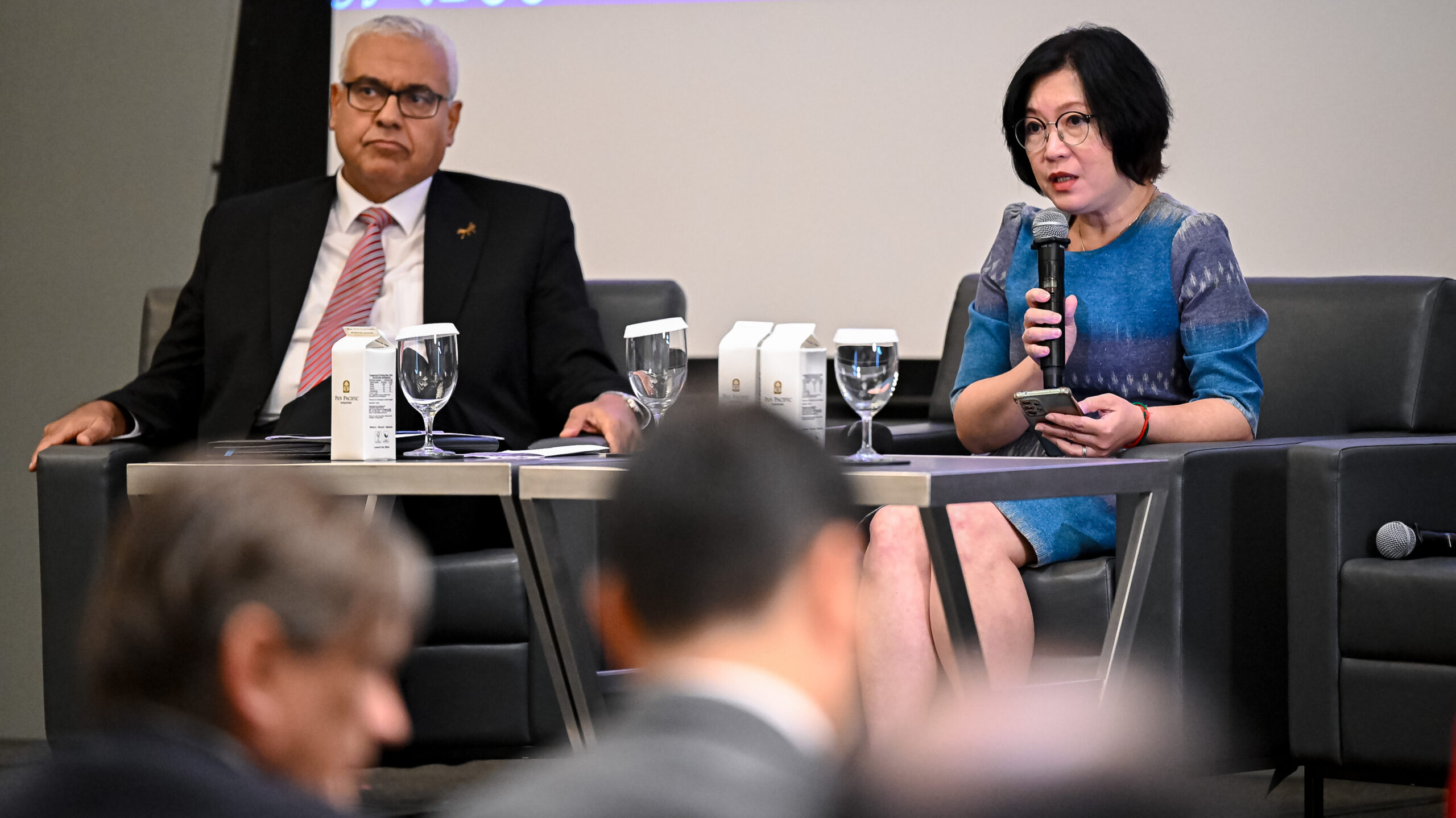
The third and final roundtable on future challenges to food supply chains saw the participation of HE Ahmed Mostafa Abdelaal Mohamed, the ambassador of Egypt to Singapore, and Honourable Arunee Hiam, the deputy director-general of Thailand International Cooperation Agency.
Two different perspectives on the current challenges were reflected in this conversation.
Mostafa highlighted the importance of creating more efficient international trading systems. Mostafa argued that international politics and separate governments must not only commit but “truly believe” in cooperation and live up to the value of goodwill upon which BRICS and ASEAN were founded.
Hiam suggested that climate change and unsustainable practices are the most detrimental factors to supply chains. This is especially relevant for Thailand, where 42% of the labor force is employed in agriculture.
Both speakers agreed that further investment in both technological and scientific innovation is necessary, alongside global cooperation, to achieve food security.
Uniting cultures through food
The roundtable was concluded with a lunch in the adjoining ballroom, where embassies from ASEAN and BRICS had set up food stalls with traditional dishes – a cultural showcase closely tied with every nation’s shared love for food.
Highlights included South African seasoned beef, Thai stir-fried chicken, Timorese dark chocolate coffee beans, and Russian fermented beverage kvass.
Copies of DNA’s launch issues were also provided to guests, and a handful of interesting conversations occurred between the attendees, living up to the collaborative spirit of the morning.

